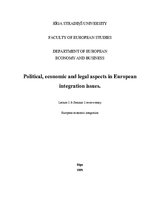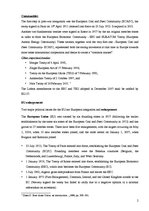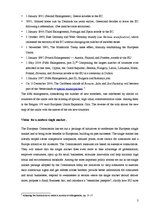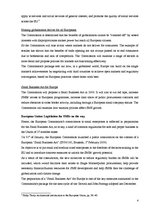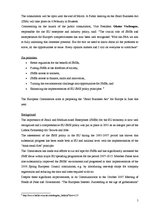Communities.
The first step in post-war integration was the European Coal and Steel Community (EC&SC), the treaty signed in Paris on 18th April 1951 (entered into force on 23 July 1952. It expired in 2002.
Another two fundamental treaties were signed in Rome in 1957 by the six original member states in order to form the European Economic Community - EEC and EURATOM Treaty (European Atomic Energy Community). These treaties, together with the very first one - European Coal and Steel Community- EC&SC, represented both the strong movement at that time in Europe towards more tense international cooperation and desire to create a “common market”.
Other important treaties:
Merger Treaty of 8 April 1965,
Single European Act of 17 February 1986,
Treaty on the European Union (TEU) of 7 February 1992,
Amsterdam Treaty of 2 October 1997, and
Nice Treaty of 26 February 2001. 1
The Lisbon amendments to the EEC and TEU adopted in December 2007 shall be ratified by EU-27.
EU enlargements
Two major political issues for the EU are European integration and enlargement.
…
Communities. The first step in post-war integration was the European Coal and Steel Community (EC&SC), the treaty signed in Paris on 18th April 1951 (entered into force on 23 July 1952. It expired in 2002. Another two fundamental treaties were signed in Rome in 1957 by the six original member states in order to form the European Economic Community - EEC and EURATOM Treaty (European Atomic Energy Community). These treaties, together with the very first one - European Coal and Steel Community- EC&SC, represented both the strong movement at that time in Europe towards more tense international cooperation and desire to create a “common market”. Other important treaties: Merger Treaty of 8 April 1965, Single European Act of 17 February 1986, Treaty on the European Union (TEU) of 7 February 1992, Amsterdam Treaty of 2 October 1997, and Nice Treaty of 26 February 2001. The Lisbon amendments to the EEC and TEU adopted in December 2007 shall be ratified by EU-27. EU enlargements Two major political issues for the EU are European integration and enlargement. The European Union (EU) was created by six founding states in 1957 (following the earlier establishment by the same six states of the European Coal and Steel Community in 1952) and has grown to 27 member states. There have been five enlargements, with the largest occurring on May 1, 2004, when 10 new member states joined, and the most recent on January 1, 2007, when Bulgaria and Romania joined. 23 July 1952; The Treaty of Paris entered into force, establishing the European Coal and Steel Community (ECSC). Founding members were the Benelux countries (Belgium, the Netherlands, and Luxembourg), France, Italy, and West Germany. 1 January 1958; The Treaty of Rome entered into force, establishing the European Economic Community (EEC), which later becomes the European Community (EC). 5 July 1962; Algeria gains independence from France and leaves the EEC.

